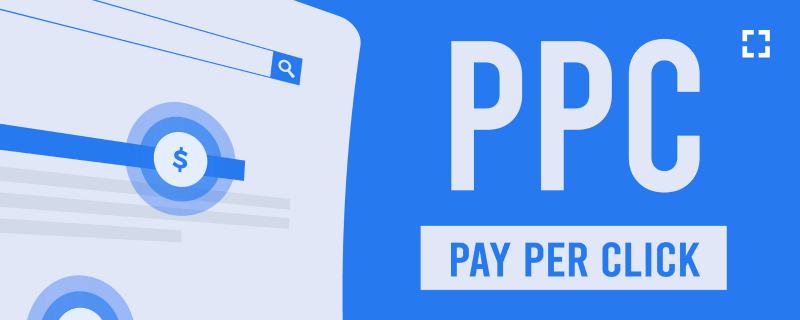
Your firm is not getting enough leads. The calls that do come in are inconsistent, low quality, or too late. At the same time, your competitors appear at the top of Google and win the clients you want.
You may have tried Google Ads or worked with a marketing agency. But without a focused strategy and expert management, PPC becomes a money pit instead of a reliable source of leads.
In this guide, you will learn how PPC actually works, what has changed in 2025, and how to run campaigns that deliver results.
PPC (Pay-Per-Click) advertising is a model where your law firm bids on keywords related to your services and pays only when someone clicks on your ad.
When a potential client searches for terms like “personal injury lawyer Jacksonville,” your ad can appear at the top of Google’s search results, ahead of organic listings. These ads are part of a Google Ads campaign designed to reach people who are actively looking for legal help.
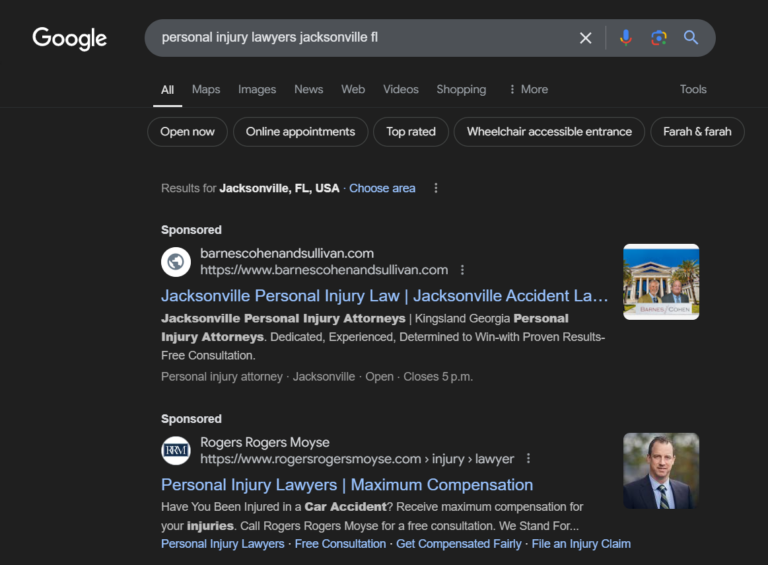
Unlike SEO, which can take months to show results, PPC delivers instant visibility. You can start getting traffic and consultations the same day your ads go live. For firms that need consistent lead flow, PPC is a direct path to predictable growth.
In 2025, PPC advertising has become more advanced. Google now uses artificial intelligence to manage bidding, match your ads with searchers, and generate headlines.
Campaign types such as Performance Max rely on machine learning to decide where your ads appear and which audiences see them. These tools offer more reach but also reduce direct control. If your campaign lacks the right structure, Google’s automation can waste your budget by targeting the wrong people or prioritizing low-value leads.
Legal keywords remain some of the most expensive in digital advertising. It’s not uncommon to pay $100 or more for a single click. That makes precision essential.
Every part of your campaign must be optimized, from keywords and ad copy to landing pages and call tracking.
When PPC is executed correctly, it puts your firm in front of high-intent prospects at the moment they are searching for legal help. It also gives you measurable data to improve your marketing, refine your message, and scale what works.
This is what makes PPC one of the most effective and accountable tools for growing a law firm in 2025.
Let’s dive into why you should consider PPC as your next law firm marketing strategy.
PPC advertising gives your law firm instant visibility in Google’s search results. Once your campaign is approved and active, your ads can start appearing for relevant searches within hours.
This means you can start generating leads the same day.
For law firms that need to accelerate growth, PPC offers a direct path to consultations without waiting months for SEO rankings.
Whether you’re opening a new practice, expanding into a new market, or trying to recover from a slow quarter, PPC is the fastest way to put your firm in front of high-intent searchers.
PPC lets you show your ads to people who are actively searching for legal help.
These are not passive browsers. They’re potential clients typing in terms like “DUI lawyer near me” or “family attorney in Austin,” searches that signal immediate need and intent to hire.
This kind of timing is nearly impossible to replicate with other channels. Social media might build awareness, but it rarely reaches people in decision mode.
PPC does. It captures potential clients the moment they are ready to act.
With PPC, you control exactly who sees your ads.
You can target by location, search keyword, time of day, device type, and even user intent. For law firms that serve specific cities or practice areas, this level of targeting ensures your ads only appear to people who are most likely to convert.
You also control your budget down to the dollar. If you need more leads during a busy season, you can raise your bids and increase your spend. If demand slows, you can scale back and preserve resources.
Google Ads provides clear reporting that shows how each dollar is performing, so you can spend with confidence.

One of PPC’s biggest advantages is its transparency.
You can see exactly what’s working, what’s not, and where your leads are coming from. Metrics like cost-per-click, click-through rate, and conversion rate give you instant feedback on ad performance.
This level of visibility helps you make smarter marketing decisions. You can refine your messaging, test new landing pages, or adjust your intake process based on live data.
PPC is not only a reliable lead source. It’s also a feedback tool that strengthens your entire marketing strategy.
PPC campaigns are powered by real-time auctions, keyword strategy, and Google’s relevance algorithm, all of which determine whether your firm shows up at the right moment.
PPC works by placing your ad in front of potential clients at the exact moment they search for legal help.
When someone types a phrase like “DUI lawyer Austin” into Google, your firm enters a real-time auction for that search term. Your ad placement depends on how much you are willing to bid and how relevant your ad is, according to Google’s algorithm. This is where Quality Score comes in.
Google evaluates your ad based on three factors: expected click-through rate, ad relevance, and the quality of your landing page. A high Quality Score can outrank a competitor’s ad even if they bid more, because Google rewards better experiences for users.
In short, you are not just paying for clicks. You are paying to win attention at the most critical decision-making moment. The better your ad and landing page, the more visibility you gain for less cost.
Legal keywords are some of the most expensive in all of digital advertising because the value of a single case is so high.
Terms like “personal injury lawyer,” “medical malpractice attorney,” or “DUI defense in [city]” can cost anywhere from $100 to $300 per click. That number may seem high. However, one of those clicks could lead to a case worth tens of thousands of dollars. High stakes create high demand. High demand drives up competition.
This is why law firm PPC cannot be run like a basic ad campaign. It requires deep knowledge of keyword selection, cost forecasting, and conversion tracking. Without that expertise, your firm will burn through budget without return.
For firms that run PPC correctly, the economics are clear. A single click that costs $150 but turns into a $15,000 client is not expensive. It is a win.
Getting someone to click your ad is only the first step. If your campaign isn’t built to convert that click into a consultation, you’re losing money with every visit.
Many law firms make the mistake of sending paid traffic to a generic homepage. Others fail to follow up with leads fast enough to win their business. High-performing campaigns avoid these traps by focusing on conversion from the beginning.
Effective PPC for law firms requires a few non-negotiables.
If the delay is hours instead of minutes, you’re likely to lose that lead to a competitor.
If a single click costs $100, the margin for error is small. Every step from ad to intake must be designed to convert.
Many law firms treat PPC like a one-time task. They set up a campaign, turn on the ads, and hope for results. That approach almost always leads to wasted budget and disappointing returns.
PPC success depends on the full system working together. Your keyword targeting, ad copy, landing page experience, and intake response time all influence your outcome. Each part must be tested, measured, and improved over time.
If you want consistent leads and a high return on ad spend, you need to treat PPC as a dynamic process. The firms that succeed with it are the ones that stay involved, stay informed, and keep optimizing.

“My website continues to dominate all the top website searches in my industry and my business has grown 10-fold as a result.”
Oykhman Criminal Defence
Google Ads has shifted dramatically in recent years, and these changes demand updated strategies from law firms.
Google now acts as your campaign manager unless you guide it with the right strategy.
To win in 2025, law firms need more than automation.
You need campaigns built on precision: focused keywords, compelling copy, optimized landing pages, and real-time oversight. Automation can improve results, but only when it’s paired with expert input.
Firms that ignore this shift risk paying for traffic that never turns into clients.
Google’s AI now plays a central role in how PPC campaigns are run. Law firms must understand where automation helps and where it introduces risk.
Google now uses AI to control the most important parts of your campaign. It sets your bids, decides who sees your ads, and can even create headlines and descriptions.
This is most common in campaign types like Performance Max and Smart campaigns.
Once your campaign launches, Google’s system uses past data and user behavior to make decisions. It chooses when your ads show, where they appear, and how they are delivered. Most of this happens behind the scenes, with limited visibility into what the system is doing.
Automation can save time and improve efficiency. But it only works if your campaign is set up properly.
If your keywords are too broad or your ad copy is unclear, the AI will still run your ads. However, it may send the wrong people to your site, which leads to wasted spend.
AI can improve your PPC performance when your campaign is well-structured and your inputs are strong.
It works well in three key areas:
When these systems work correctly, they help law firms reach more potential clients, more efficiently, and at a better cost.
AI is powerful, but it doesn’t always get it right. Without human input, it can lead to wasted spend and poor results.
Here are the most common issues:
AI is useful, but it’s not strategic. It needs a clear structure, tight targeting, and well-crafted content to perform well.
AI can make your campaigns faster, broader, and more efficient. But it doesn’t know your practice, your goals, or your clients. If you let it run without strategy, it’ll optimize for the wrong things.
The law firms seeing the best results in 2025 use AI as a tool, not a crutch. They combine automation with smart planning, strong creative, and clear goals.
That’s the difference between running ads and running a system that actually brings in clients.
Search ads are only part of the PPC ecosystem. The right mix of platforms depends on your goals, budget, and practice area.
Search ads target people actively looking for legal help. These users have strong intent and are often ready to contact a firm.
LSAs appear at the top of Google and allow users to call or message you directly. You only pay per lead, not per click.
Bing’s search volume is lower than Google’s, but the cost per click is often cheaper. It’s a smart addition for firms with efficient intake systems.
Display ads appear across websites, apps, and YouTube. They are less targeted than search but perfect for staying top-of-mind.
Meta’s ad tools allow precise targeting by demographics, interests, and location. These platforms help firms connect early in the decision-making process.
Video helps potential clients see and hear you, which builds credibility. YouTube allows local targeting with short, effective video ads.
Running ads is easy. Converting clicks into actual cases? That takes strategy.
These 11 tactics come from years of hands-on experience managing legal PPC campaigns. Use them to tighten your targeting, improve your conversion rates, and stop wasting money on unqualified leads.
Each one is practical, proven, and essential if you want to compete in today’s market.
Before you write an ad or choose a keyword, you need to know exactly who you’re targeting. Are they searching during a crisis? Do they live in a specific zip code? Are they looking for aggressive defense or compassionate help?
When you understand your client’s mindset and situation, your copy gets sharper and your targeting gets smarter.
Everything from ad language to landing page tone should reflect the client you want to attract.
Create your perform client persona using the attributes below to get started.
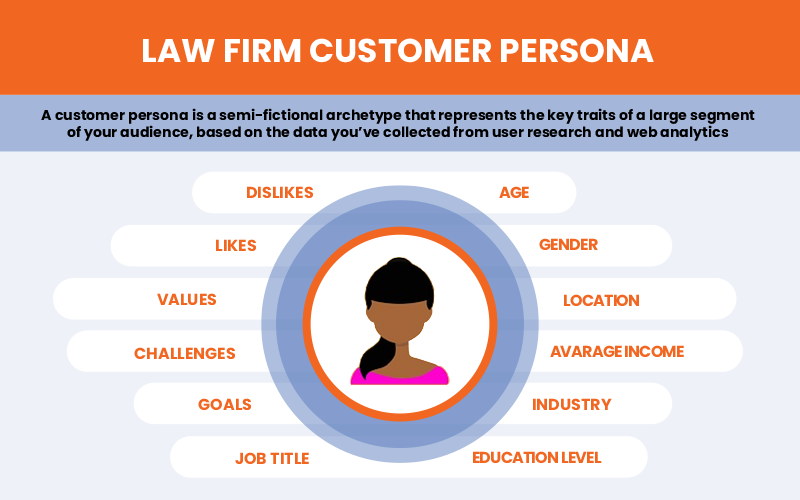
Legal intent is local. Someone searching for a “divorce lawyer” in Phoenix doesn’t want results from Chicago.
Add geo-modifiers like city names, neighborhoods, or even zip codes to your keywords. Use location-based ad copy too (“Serving clients in Oakland” or “Trusted Austin family law firm”) to boost relevance and click-through rates.
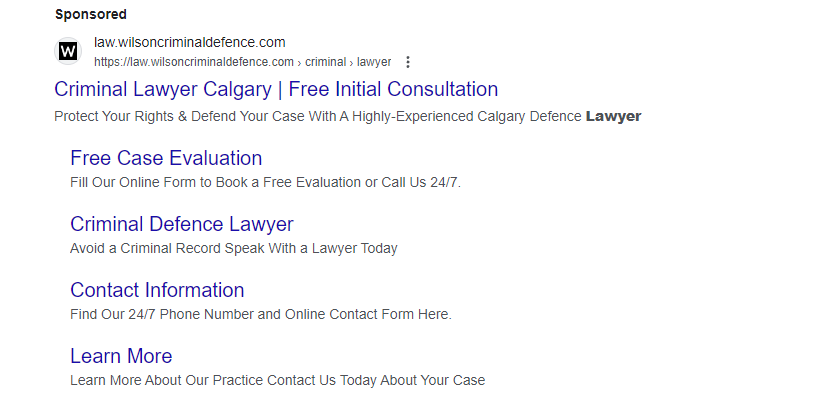
This also helps you qualify traffic, meaning fewer wasted clicks from people outside your service area.
Not every click is a good click. If you don’t actively exclude irrelevant terms, Google will waste your budget fast.
Add negative keywords to block search queries that attract bad leads. These might include phrases like “free legal help,” “pro bono,” or case types you don’t handle. By filtering out unqualified traffic before they even see your ad, you protect your budget and improve lead quality.
Negative keywords keep your campaign focused on the searches that actually convert.
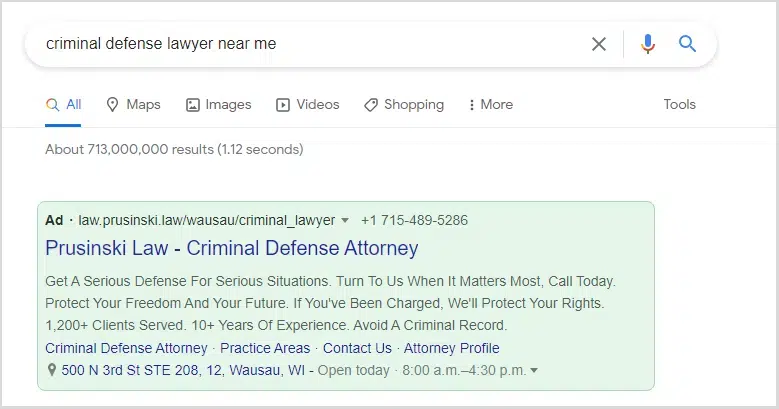
Clicks don’t matter if your landing page doesn’t convert.
You should send paid traffic to a dedicated landing page. Avoid using your homepage.
The landing page should focus on one service, one message, and one action. That action should be encouraging the visitor to contact your firm.
Remove distractions. Keep it mobile-friendly. Make sure it loads fast and is easy to scan.
Strong landing pages turn interested searchers into actual leads. That is how you get ROI from PPC.
Here’s a look at one of our client’s landing pages.
Most legal searches now happen on mobile devices. If your site isn’t mobile-optimized, your leads will bounce before they even read your offer.
Make sure your landing pages load fast on phones, buttons are easy to tap, and your forms don’t frustrate users. Mobile visitors expect speed and simplicity. If you don’t deliver it, someone else will.
A mobile-friendly experience increases conversions and lowers your cost per lead.
Tracking shows you what’s working. Speed shows your clients you care.
Use call tracking and conversion tracking to see which ads generate phone calls, form fills, and real leads. But don’t stop there. How fast you follow up matters just as much.
Potential clients are usually in crisis mode. They often hire the first firm that picks up or responds. A Harvard Business Review study found that businesses responding within an hour are nearly 7x more likely to qualify a lead. Conversica reports that responding within five minutes can drive up to 70% conversion rates, compared to just 5% after 24 hours.
If you can’t reply right away, set up automated emails to confirm consults. Use chatbots to answer questions and keep leads engaged until someone follows up.
Ad extensions make your ads larger, more informative, and easier to engage with. They give people more options to take action. This could include calling your office, visiting a specific service page, or viewing your location.
Use sitelinks to highlight key practice areas. Add callouts for details like “Free Consultations” or “24/7 Availability.” Include your location and phone number using structured snippets.
These additions help your ad stand out. They also improve your clickthrough rate without increasing your bid.

Your first draft is rarely your best performer.
Test different headlines, descriptions, and calls to action to find out what actually drives clicks and conversions. One version might resonate more with clients in crisis. Another might appeal more to business decision-makers.
Set up structured A/B tests in Google Ads. Use performance data to determine which message works best. Then focus your budget on what consistently converts.
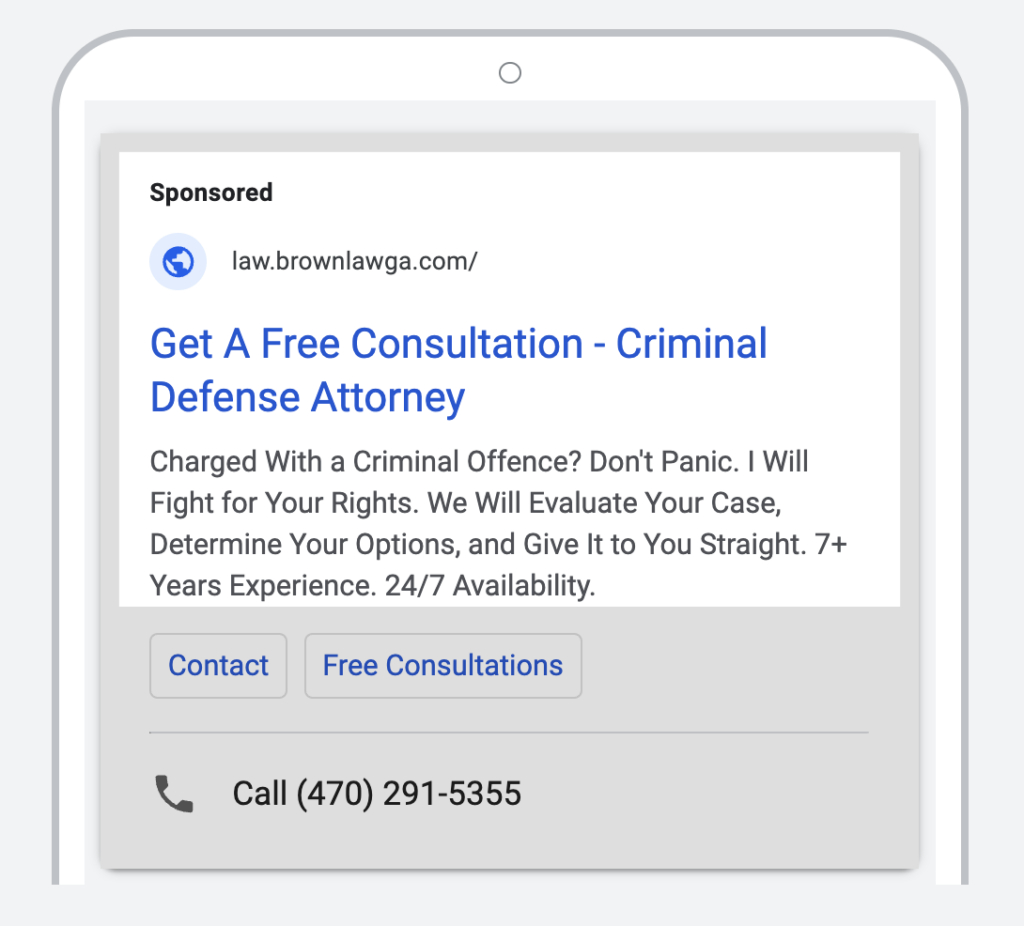
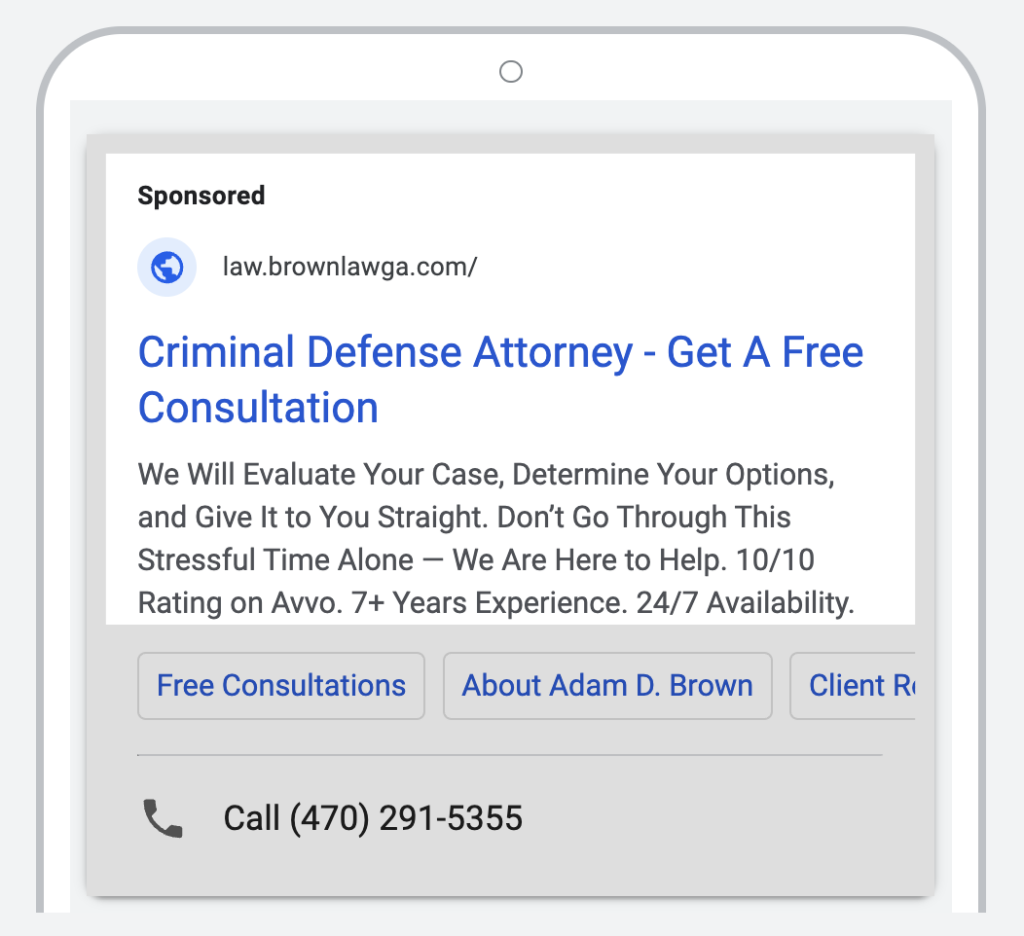
Most people don’t convert the first time they visit your site. Remarketing keeps your firm top of mind while they research and compare options.
Show targeted display ads to people who clicked but didn’t contact you. Remind them of your services, reinforce your credibility, and bring them back when they are ready to hire.
Remarketing helps you recover lost traffic and stretch your ad budget further.
Local Services Ads (LSAs) place your firm at the very top of the search results. They appear above regular PPC ads and highlight verified lawyers, your Google reviews, and a clickable phone number for direct contact.
LSAs use a pay-per-lead model. This means you only pay when someone actually contacts your firm. For many law firms, LSAs generate high-quality leads at a lower cost than standard Google Ads.
If your practice area qualifies, make LSAs a key part of your strategy.
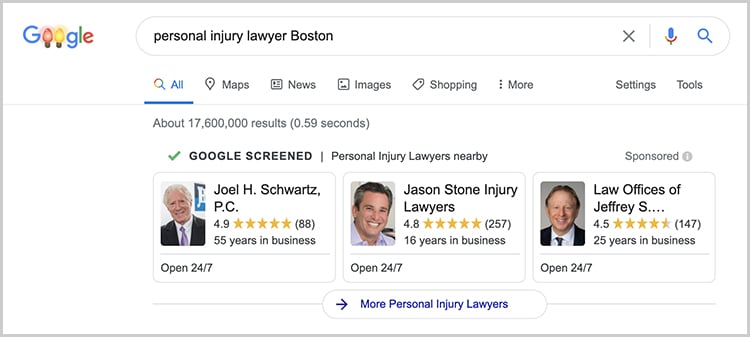
Generic ads do not convert. You need to speak directly to the types of cases you want.
If you handle family law, use ad copy that mentions divorce, custody, or support. Don’t rely on vague phrases like “legal help.” If you focus on startups, include terms like incorporation, contracts, or founder disputes.
The more specific your message is, the more it resonates with your ideal client. Clear messaging helps filter out low-quality leads and improves your conversion rate.
Your competitors are likely bidding on your law firm’s name. If you’re not protecting it, you risk losing leads who were already looking for you.
Branded search campaigns are inexpensive and convert well. They ensure that your firm shows up first even when someone types your name into Google.
This tactic also helps control your messaging and keeps click costs low for high-intent traffic.
Adding audience layers to your search campaigns helps you refine delivery. You can target users based on interests, online behavior, demographics, or even previous site visits.
This lets you bid more aggressively for high-value segments, exclude poor-fit audiences, and tailor your ad copy more precisely.
Audience filters add a layer of strategy that keyword targeting alone cannot deliver.
Your best future clients often look a lot like your past ones. Use your CRM, intake system, or client database to create remarketing and lookalike audiences in Google Ads.
Upload past leads or case data to build custom audiences. You can then retarget them with display ads or find new users with similar traits using Google’s audience expansion tools.
First-party data makes your campaigns smarter, more efficient, and more aligned with your real-world clients.
Legal ads must follow clear rules. We build every campaign to comply with ABA standards, state bar guidelines, and platform policies.
Running a law firm is already a full-time job. Trying to manage PPC on top of that often leads to frustration and wasted spend.
Google Ads changes all the time. And while automation can help, it only works if your campaign is set up correctly from the start. Without a clear strategy, your budget disappears fast and your results don’t improve.
Here are common mistakes we see law firms make:
These mistakes cost money every day. And the longer they go uncorrected, the harder they are to fix.
You don’t need to learn Google Ads. You need someone who already knows how to make it work.
We build campaigns that deliver. That means clear targeting, strong landing pages, accurate tracking, and hands-on management. Because when your PPC is built the right way, it becomes a steady, scalable source of leads for your firm.
Case in point: Immigration Desk
One of our clients, Immigration Desk, faced a crowded and competitive legal market. By creating precise landing pages and tightly managed Google Ads campaigns, we helped them generate over 100 qualified leads every month. This is what happens when PPC is run with focus and strategy.
Choosing to outsource your law firm’s PPC ad management can be a game-changer.
Sure, you could set up a PPC campaign yourself, but it requires a lot of time and experience to optimize a campaign to peak efficiency. Without an expert set of eyes, you could end up throwing thousands of dollars away with very little ROI.
Specialized agencies bring a wealth of experience and up-to-date industry knowledge that can significantly improve the effectiveness of your campaigns. They have the tools and expertise to conduct in-depth keyword research, craft compelling ad copy, and design optimized landing pages that convert.
Our dedicated team here at JurisPage has decades of PPC experience and stays ahead of the curve with the latest industry insights, so your campaigns are as effective as possible.
With our in-depth keyword research, creation of compelling ad copy, and design of high-converting landing pages, we focus on driving not just traffic, but qualified leads to your firm. Our vigilant monitoring and agile campaign adjustments are designed to maximize your ROI, freeing you up to excel in the practice of law.
Interested? Reach out for a free consultation today.
Ready to maximize your marketing budget? Fill out the contact form or call us today for a complimentary consultation. We will listen to your story, work to define your business objectives, and recommend an approach to deliver maximum ROI for your firm.
By using this website, you consent to our use of cookies in accordance with our Cookie Policy. Cookies help us enhance your browsing experience and provide personalized content. If you do not agree to our use of cookies, please adjust your browser settings accordingly.